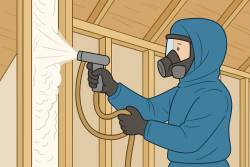Times have changed work experience is not the same either. The Covid pandemic, employee relocations, and personal preferences have led many people to work from home now. Working from home saves you commute expenses and daily hassle. However, it comes with its challenges, for instance, noise disturbances. Nearby construction sites, kids at home or noisy neighbourhoods can become the source of distraction. No worries, we have got your back. There are a couple of options that you have that Reitzel can help with. Utilize our valuable services if you want to use blown-in products or spray foam.
Fill the Holes in the Walls
Soundproofing walls can be achieved by completely insulating them. If there are gaps and holes in the wall, they result in sound penetration. You can hire an insulation company to inspect your walls for crooks and holes. They will examine the current situation of your walls and suggest a soundproof material like spray foam or blown-in insulation to fill the openings in the walls.
Caulk Drywall Empty Spaces
Another reason your home office is not soundproof can be due to spaces in the drywall. There might be gaps around ductwork and electrical boxes; caulk these cracks and crevices to soundproof the workroom completely. You can limit the amount of sound that enters your office by sealing the holes with all-purpose caulk.
Soundproof the Windows
Windows are the primary entry point of noise. If your house is located on a busy street, constant noise can disturb your work sanctuary. The solution is to soundproof the windows; it can be done in two ways. If you have the budget, upgrade your old single-pane model to a double- or triple-pane one. If finances are limited, install interior window shutters and hang thick curtains to block additional noise.
Add Soundproof Material in Ceiling
If you live in an apartment building and are constantly bothered by noise from above, you need to fix the ceiling. Also, people with an office in the basement face this problem. You can add thicker insulation to the roof. Consider constructing a drop ceiling and filling the area between the old ceiling and the new dropped panels with high-density insulation for long-term noise reduction.
Make the Floor Soundproof
Home offices with hard floors such as tiles intensify the sound waves. It will be expensive to replace the whole flooring material; an easy fix is to add layers of rugs to avoid noise production from the floor. It is more sustainable to add soundproof insulating material under or at the top of the floor. You can always hire a professional if you do not want to soundproof your flooring yourself. For one thing, they might be able to assist you in determining what would work best in your home.
Consider Installing a Door Sweep
Gaps beneath the doors are an immediate source of insects and outdoor noise. Set up a sweep under the door to seal this space; it will work like magic. This will reduce the sound that enters via the door. Install weatherstripping around the sides and top of the door to further decrease sound transfer. You should also replace your hollow-core door with a solid door, as noise frequently enters from these spaces.
Use Soft Wall Hangings to Block Noise
Another way to effectively reduce sound passage into your home office is to hang layers of soft wall hangings. Soft wall hangings like quilts or an attractive rug on a wall in your home office can limit sound transfer just like insulation does. Thick wall hangings or rugs will add aesthetics and soundproofing to your home office. The item's thickness determines how well it absorbs sound.
Reitzel Insulation has been helping customers with the same problems for a long time. If you need to soundproof your office from the rest of the house, call our office at 519-886-6100. We provide free on-site estimates!

















